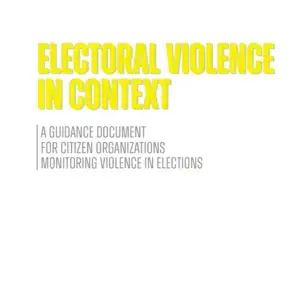WASHINGTON, DC—In stark defiance of the threat of violence, Afghan voters went to the polls in apparent record numbers April 5 in presidential and provincial council elections that could mark the first democratic transfer of power in the nation’s history.
“Voters throughout the country demonstrated their determination to move the country’s fragile democratic process forward,” the National Democratic Institute (NDI) said in a preliminary statement.
NDI fielded an observer delegation of 101 Afghan staff members who visited 327 polling stations in 26 provinces. Many of those observers helped prepare 46,000 candidate and political party polling agents in the lead up to the elections. The Institute also trained 281 of 299 women provincial council candidates and put on a candidate orientation program for 1,715 (more than 60 percent) of provincial council candidates.
NDI’s program had included 15 international long-term observers who spent five weeks in Afghanistan analyzing developments in the electoral process and releasing periodic reports. They were withdrawn from the country after the March 20 attack on the Kabul Serena Hotel in which NDI observer Luis Maria Duarte of Paraguay was killed along with eight other people. NDI dedicated its mission to Luis and all who have lost their lives defending the hopes and democratic aspirations of the Afghan people.
NDI said the remarkable turnout along with the significant participation of Afghan election monitors, political parties, women, young people and others bodes well for the credibility of the electoral process. More than triple the number of domestic monitoring groups applied for accreditation this year over 2009, and five groups collectively deployed more than 10,000 observers on election day covering all 34 provinces.
The Institute noted that since the margins among the contestants may be slim and a small number of votes may affect the outcome, it is critical that observers follow the tallying and complaints process closely to help ensure the integrity of the continuing electoral process. Only after the electoral institutions have completed their activities can a final assessment be made, NDI said.
While election day experienced fewer violent incidents than in 2009, several attacks occurred around the country and 205 polling centers did not open due to security concerns, in addition to those previously closed for security reasons. In those areas and locations where turnout was limited, terrorist actions caused disenfranchisement – though the significantly increased participation over the last elections defeated extremist attempts to derail these polls.
NDI highlighted a number of improvements in the electoral process that have been put in place since the last round of elections in 2009 and 2010. They include a new legal framework and operating structure, creation of a special commission focused on election security, and the involvement of Afghan parliamentarians and civil society representatives in selecting nominees to the electoral bodies that oversee the elections, a process that was previously dominated by the president.
Reacting to lessons from previous elections, new anti-fraud measures were created, including a focus on the chain of custody of sensitive election materials and procedures for identifying tampering. They included a new tracking system with barcodes to trace the movement of ballot boxes and results forms, tamper-resistant tape to secure ballots for transport and the use of stronger indelible ink. Domestic monitors and NDI observers reported that while some polling personnel varied in their conduct of these procedures, many implemented them properly.
NDI said planning for the transition of power to the incoming government will be critical in ensuring the country’s stability, particularly in light of the security issues it confronts.
The Institute’s preliminary statement also included several recommendations to:
- Ensure transparency in the electoral process. Observers should be provided unimpeded access to observe remaining election processes, including the vote tally and complaints process. This is important for ensuring continued public confidence in the administration of the polls.
- Prepare for a possible runoff by focusing on the security of polling stations, especially those that were closed for security reasons on April 5.
- Prepare a transition plan to help facilitate the smooth transfer of power.
The April 5 observation was informed by an NDI pre-election assessment mission in December.
NDI’s election observation was funded by a grant from the U.S. Agency for International Development.




